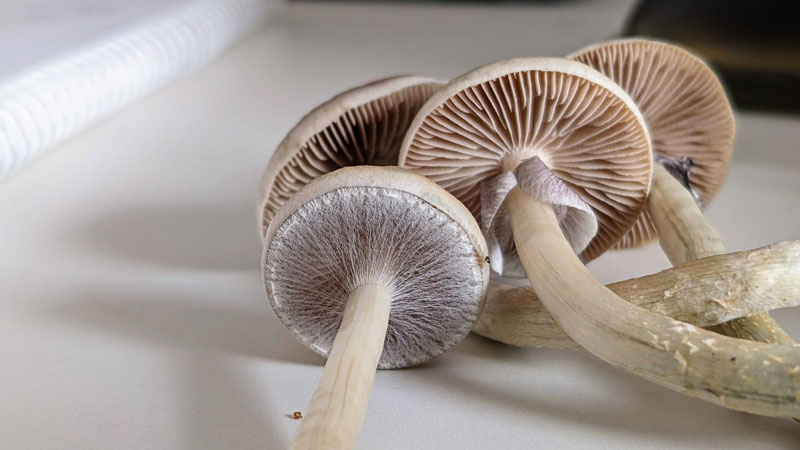Substances | 5 min read
How Long Do Shrooms Last? Effects and Detection Windows
Medically Reviewed By

On October 2, 2023
Written By
On October 2, 2023

What you will learn
- Effects of mushrooms usually appear within the first 20 to 40 minutes.
- Tolerance to magic mushrooms can be built if the same types of mushrooms are used for each trip.
- Most drug tests cannot detect shrooms in the body’s system.
- There are two methods for taking psychedelic drugs: micro-dosing and macro-dosing
Effects of mushrooms usually appear within the first 20 to 40 minutes of consumption and typically last 3 to 6 hours.[1] Once the shroom trip has ended, there may be some residual effects from the drug, which can last until the day after the trip has ended. However, the body should return to a normal state within 24 hours.
Shrooms, also known as magic mushrooms, are hallucinogenic when consumed. This drug contains psilocybin, which has effects that are similar to those of LSD. These effects include the body’s senses being heightened and sensory hallucinations. The amount of time they last will depend on many different factors of the drug and the person consuming it.
For those experiencing prolonged or severe aftereffects, an intensive outpatient program such as those available for detox in NYC, can provide support and treatment to help individuals return to a normal state more effectively.
Factors That Affect The Shroom Trip Length
The length of time the effects of shrooms last in the body depends on various factors. All of these factors will make an impact on how severe the trip is and how long it lasts. These variables range from an individual’s body type to their level of tolerance and mindset. [2]
Tolerance
While tolerance does not usually affect the length of the shroom trip, it does affect the intensity. Tolerance to magic mushrooms can be built if the same types of mushrooms are being used for each trip and how often they are used.
Some people develop a short-term tolerance if they try to take another trip too soon after one has ended. When a tolerance is developed, it will cause an increase in shroom dosage to be needed in order to achieve the same effects from the drug.
Tolerance to shrooms is also dependent on the overall health of the person taking shrooms as well as their body weight. Consuming too high of a dose of shrooms can carry serious risks, such as being on a trip that is difficult to navigate.
Setting and Set
The physical environment and surroundings are referred to as the setting. The set refers to the mindset that someone is in before taking the mushroom trip. These two factors can play a part in how long the shroom trip lasts or how long the mind perceives it to last.
Magic mushrooms can cause a warped sense of time. This may result in a particularly stressful moment, feeling like it has gone on for a long period when, in reality, it has only lasted 30 seconds. It may also cause happy moments to go by within mere seconds when they last longer than that.
Because the set and setting can impact the feeling of the trip and how long it lasts, it’s important to have good physical and mental health before taking the drug.
Method Of Consumption
The method of consumption has a large impact on how long the effects of shrooms will last. Mushrooms come in many different forms, such as dried whole mushrooms, ground up, and made into tea. This is due to how the body metabolizes the drug.
These different forms of mushrooms may cause a trip to start earlier than others. There have also been ways to speed up the trip process. When dried ground mushrooms are soaked in lime or lime juice prior to being consumed, it will cause the drug to take effect much more quickly.
Mushroom Dosage
The dosage of mushrooms consumed plays a large part in how long the trip will last. There are two kinds of methods for taking psychedelic drugs, micro-dosing and macro-dosing.
Macrodosing Vs. Microdosing
Macrodosing is when a large amount of shrooms is taken to have an intense psychedelic experience. Macrodosing will cause the trip to last six hours or longer. In this case, the setting and mindset are important to avoid going down a bad trip.
When large amounts are consumed at a time, many emotions and feelings will be felt at the same time. This can be dangerous if someone is depressed beforeprior to taking the drug.
Microdosing is the opposite of macrodosing. It involves taking a very small quantity of magic mushrooms. These trips are typically much shorter due to the lower amount of the psychedelic drug in the system. Microdosing usually involves taking about a tenth of the amount of mushroom needed, about 0.1 -0.3 grams.
Can you overdose on mushrooms?
A study was conducted on the use of magic mushrooms involving 9233 shroom users. Out of that number, 19 (0.2%) reported needing medical attention due to their effects.[3] The main effects presented were paranoia, panic, and anxiety due to a high dose of the drug.
How Long Shrooms Stay In Your System
Shrooms have a “half-life” and metabolize in the body’s system much faster than other drugs. While there may be residual effects of taking the drug up to 24 hours after the trip, the amount of time it can be detected in the body’s system varies from person to person.
How Long Are Shrooms Detected By Drug Tests?
Typically, shrooms are not detectable after 6 hours of taking them. Most routine drug tests won’t be able to detect them. More specialized tests may detect shrooms in the body’s system, but these aren’t usually used due to the cost.
Blood, saliva, and urine tests usually won’t be able to detect the presence of the drug unless the test has been completed within a few hours of consumption. If a hair follicle test is used, then it may be detected for up to 90 days.
Factors That Affect How Long Shrooms Are In Your System
Some factors will affect how long shrooms are in the system. These are often things that are out of the control of the consumer.
Type Of Mushroom
Mushrooms contain psilocybin, which is the element of the mushroom that creates the psychedelic effects. Different mushroom species have different amounts of psilocybin present in them. When ingested, it’s difficult to tell how much of the drug is present. A higher amount of psilocybin present means that it will be in the body’s system for a longer amount of time.
Your Body And Age
When the body gets older, the liver and kidney function and metabolism can slow down. This will cause the psilocybin to leave the body at a slower pace. Body mass index (BMI) and how hydrated the person is when they consume the drug will also have an impact on the rate at which psilocybin is excreted from the body.
Method Of Use
While there are many ways to consume shrooms, the way that it is done will have an effect on how long it stays in the body. This is due to how the body metabolizes certain substances.
Time Before Testing
Since mushrooms usually leave the system quickly, it depends on when the test is. If the test is within a couple of hours after taking the drug, it may cause them to show up in the drug test. It also depends on which test is being used to search for the presence of shrooms.
How Much You’ve Had To Drink Or Eat
When the digestive system is full of food, it will cause the psilocybin to stay in the system longer than if mushrooms were taken on an empty stomach. The amount of water consumed will also make an impact on how quickly it moves through the system.
Dosage
The higher the dose of shrooms, the more likely it is to stay in the body’s system longer. If a small dose is taken, then it will likely move through much faster than when having a large dose.
Other Substances In Your System
Taking other substances will increase the effects of mushrooms. It will also make a difference in how long it takes to excrete from the body. Drinking alcohol while taking mushrooms affects how the body is able to process the shrooms.
When The “Magic” Wears Off
The effects of taking shrooms vary from person to person but can lead to undesirable effects and cause the drug to remain in the system for a longer amount of time. Professional substance use disorder treatment is the best approach to ridding the body of harmful substances and establishing healthier habits. If you find yourself unable to stop taking mushrooms, the team at our drug rehab in NYC can help. Contact Ascendant New York today, help is just a call away.
Tolerance may be one of the most prominent long-term effects of consuming mushrooms frequently. Someone may also become used to the effects or desire them more often once they begin taking mushrooms.
In the United States, mushrooms are considered illegal, which will cause legal troubles if they are found. Some other countries have made mushrooms legal.
Routine drug tests typically cannot detect the presence of mushrooms. This depends on the time of consumption and the time of the test. Some tests, such as hair follicle tests, may detect the drug for up to 90 days.
Ascendant New York Editorial Guidelines
Here at Ascendant New York, we understand the importance of having access to accurate medical information you can trust, especially when you or a loved one is suffering from addiction. Find out more on our policy.
[1] Daniel J, Haberman M. Clinical potential of psilocybin as a treatment for mental health conditions. Ment Health Clin. 2018 Mar 23;7(1):24-28. doi: 10.9740/mhc.2017.01.024. PMID: 29955494; PMCID: PMC6007659. Retrieved from https://www.ncbi.nlm.nih.gov/pmc/articles/PMC6007659/ 2023, June 13th
[2] Lowe H, Toyang N, Steele B, Valentine H, Grant J, Ali A, Ngwa W, Gordon L. The Therapeutic Potential of Psilocybin. Molecules. 2021 May 15;26(10):2948. doi: 10.3390/molecules26102948. PMID: 34063505; PMCID: PMC8156539. Retrieved from https://www.ncbi.nlm.nih.gov/pmc/articles/PMC8156539/ 2023, June 13th
[3] Kopra EI, Ferris JA, Winstock AR, Young AH, Rucker JJ. Adverse experiences resulting in emergency medical treatment seeking following the use of magic mushrooms. J Psychopharmacol. 2022 Aug;36(8):965-973. doi: 10.1177/02698811221084063. Epub 2022 Apr 7. PMID: 35388724; PMCID: PMC9353971. Retrieved from https://www.ncbi.nlm.nih.gov/pmc/articles/PMC9353971/ 2023, June 13th




